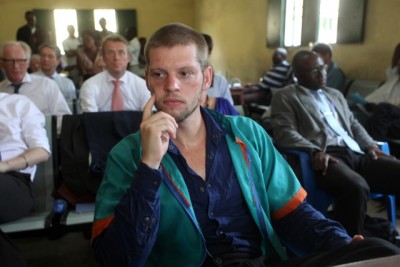A court in the Democratic Republic of Congo found Norwegian-British man Joshua French guilty of murdering his friend, Norwegian Tjostolv Moland, in the cell they shared in a Kinshasa jail last August. On Wednesday French was sentenced to life in prison on top of the death sentence he already faced, and his lawyer was not sure if the team would appeal the decision.

Judge Serge Kabondo spent several hours delivering his verdict, reported Norwegian Broadcasting (NRK). He said the evidence did not support the claim Moland took his own life, and ruled instead that French killed him and moved the body to make it look like suicide. He referred to evidence showing Moland had been drinking vodka, and believed he would have been too drunk to do anything but sleep, let alone kill himself.
“The Norwegian expertise said the victim had a blood alcohol level of 2.7,” Judge Kabondo read. “That means he was very drunk. The toxicologist has said that he would have lost control of himself. The person will be unconscious and have no idea what’s going on. He no longer exists on the mental level, and will be very weak on the physical.” Kabondo said French’s own evidence was that he drank less than Moland, and the judge believed that was because he intended to kill his friend.
Kabondo said French gave contradicting evidence about how the pair got hold of the vodka, whether a warden was involved, and items in the cell when Moland died, which weakened his credibility. He said French had a motive, because it was Moland who was convicted of murdering their driver in 2009 which saw the colleagues sentenced to death. He believed French had not forgiven his friend for the crime.
Experts said no criminal evidence
The Norwegian criminal police Kripos took part in the investigation, and a Norwegian coroner was involved with the autopsy. They testified before the court that there was no suspicious evidence surrounding Moland’s death. Drug traces found in his blood were so small, Moland must have taken a sleeping pill several days before he died.
Kabondo disagreed, saying Moland would’ve sustained injuries if he’d killed himself. The court found no such evidence on Moland despite the Congolese authorities’ initial suicide finding last August. He ruled that the sedatives enhanced the effects of the alcohol.
Appeal uncertain
French’s Norwegian lawyer, Hans Marius Graasvold said he can no longer guarantee they’ll appeal the decision. “It’s a complicated assessment,” he told NRK. “We see how French gradually deteriorated because of this court case. We have his health situation to take into regard.” Graasvold said French is already on a death sentence so the latest decision doesn’t change his practical situation, but it was a huge blow to French personally to be convicted of killing his best friend.
Doctors who have examined French throughout the trial said he had developed a stress-related condition and was in an extremely vulnerable state. His mental health caused delays during the trial, and led Judge Kabondo to postpone his verdict several times.
Judge Kabondo ultimately decided French was strong enough to hear the court’s decision, because he had tested French’s mental health by asking him questions several times over. “He has mostly, in 90 percent of the cases, given the same answers,” Kabondo said, believing French’s consistent answers and behaviour throughout the trial showed he was mentally stable.
Norwegian lawyers react
Human rights lawyer Njål Høstmælingen from the International Law and Policy Institute told NRK the case appeared to be a foregone conclusion, where the judge arranged the papers to match the decision he’d already made. “It appears to be a huge leap from the evidence which was presented in court and the decision that the judge has reached,” he said.
Høstmælingen feared the considerable media and diplomatic pressure surrounding the case caused the Congolese authorities to feel Norway was treading on their toes. “There are much larger issues involved here than in a normal murder case,” he said. “The case has reached a level where it touches a form of national pride in which the Court and the political authorities want to show that “yes, we are a constitutional state and democracy. We can not have special arrangements just because it’s a white man involved in a murder case here in our country”.”
Professor Jo Stigen at the University of Oslo’s public law institute said as in Norway, Congolese criminal law goes on the presumption of innocence until guilt is proven beyond doubt. “You have two conflicting reports, so then it’s hard to say that there is no doubt,” he explained. “With the evidence we had pictured, it was wrong to judge.” He said there was no lack of evidence in the case, but he completely disagreed with the conclusion the court reached.
Both experts said the case was no longer a legal situation, but a political one. Diplomatic work has been underway for months to get French extradited to Norway, and Congo’s relationship with Norway and the UK remained at stake. The possibility of President Joseph Kabila pardoning French remained.
newsinenglish.no/Emily Woodgate

